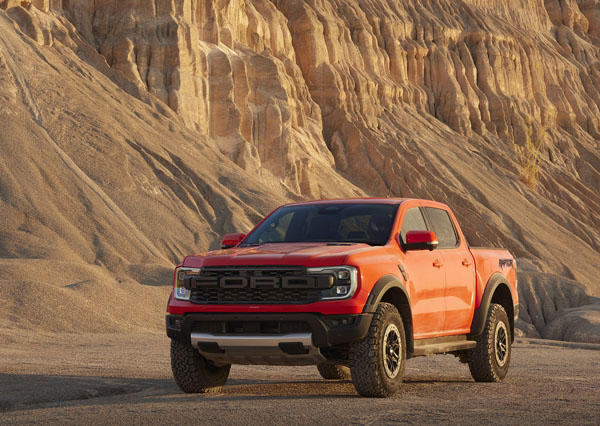
The Next-Generation Ford Ranger Raptor has arrived. Ford tells us it’s; “Designed and
engineered to dominate in the desert, master the mountains and rule everywhere in
between, the second-generation Ranger Raptor raises the off-road performance bar as a
pick-up built for true enthusiasts.”
It is powered by a new 3.0-litre V6 Twin Turbo EcoBoost engine producing up to 292kW at
5650rpm and 583Nm of torque at 3500rpm tuned by Ford Performance.
Raptor’s anti-lag system – available in Baja2 mode – keeps the turbochargers spinning for
up to three seconds after the driver backs off the throttle, allowing for faster resumption of
acceleration out of corners or between gears when the driver gets back on the accelerator.
Mated to a 10-speed automatic transmission with each gear programmed with its own
boost profile. An electronically controlled active valve exhaust system amplifies the engine
note in four selectable drive modes (Quiet, Normal, Sport and Baja2).
Drivers can choose their preferred engine sound by pressing a button on the steering
wheel, or by selecting a drive mode that uses one of the following settings:
Quiet – Designed to prioritise low-volume over performance. Great for keeping the peace
with neighbours on early mornings.
Normal – Intended for everyday use, this profile offers an exhaust note with presence
while not being too loud for street use. This profile is applied by default to Normal,
Slippery, Mud/Ruts, and Rock Crawl modes.
Sport – Offers a louder and more aggressive note, for when you want to shake things up a
little.
Baja2 – This is the most aggressive of the exhaust profiles in both volume and note and is
intended for off-road use only.
The suspension has lightweight aluminium upper and lower control arms, long-travel front
and rear suspension and refined Watt’s link equipped coil-spring rear suspension have
been designed to deliver more control across rough terrain.
Next-generation FOX 2.5-inch Live Valve Internal Bypass shock absorbers are filled with
Teflon-infused oil that reduces friction by around 50 percent compared to those on the
previous Raptor.
While the suspension hardware is from FOX, the tuning and development work was
carried out by Ford Performance using a mixture of computer-aided engineering (CAE)
and real-world testing.
In addition to working with the drive modes, the system works in the background to
prepare the Ranger Raptor for different conditions. As the shocks compress, different
zones within the bypass system give exactly the amount of support needed for the travel
being used, and work in reverse as the shocks rebound to full height.
To provide protection against severe bottom outs, FOX’s Bottom-Out Control provides
maximum damping force in the last 25 percent of shock travel. The system can stiffen the
rear dampers to prevent Raptor from squatting under hard acceleration.
Made from 2.3mm-thick high-strength steel, the front bash plate is almost double the size
of the standard Ranger bash plate. This bash plate, combined with the engine under shield
and transfer case shield, provides protection for key components like the radiator, steering
system, front cross member, engine sump and front differential.
For the first time, Ranger Raptor gets an advanced permanent four-wheel drive system
with an all-new electronically controlled on-demand two-speed transfer case, combined
with front and rear locking differentials.
On-road
Normal – designed for comfort, fuel efficiency and drivability;
Sport – more responsive for spirited on-road driving; and
Slippery – for more confident driving on slippery or uneven surfaces.
Off-road
Rock Crawl – provides optimal traction and momentum on loose surfaces;
Sand – for use in soft sand and deep snow conditions, optimising power delivery and
transmission shifts;
Mud/Ruts – for maximum grip off-road during launch and maintaining vehicle momentum;
and
Baja2 – tuned for high-speed off-road performance with all systems set for maximum
attack.
“Everything designed for the Next-Generation Raptor is there for a reason,” said Dave
Dewitt, Ranger Raptor Exterior Design Manager. “We’re communicating what Raptor can
do just by the way it looks.”
The cabin features jet fighter-inspired sports seats front and rear. They are sad to be not
only more comfortable but also more supportive during spirited cornering.
Code Orange accents on the instrument panel, trim and seats are enhanced by Raptor’s
ambient lighting, which illuminates the interior in an amber glow. A leather sports steering
wheel with thumb swells, on-centre marking and cast magnesium paddle shifters
completes the picture.
Next-Generation Ranger Raptor has a fully digital cabin, with high resolution 12.4-inch
digital cluster and 12-inch centre touchscreen incorporating Ford’s SYNC 4A5 connectivity
and entertainment system, which offers both Apple and Android6 wireless smartphone
connectivity.
Compatible smartphones can be wirelessly charged via a pad at the base of the centre
console. Ford says, “A Bang & Olufsen sound system provides the soundtrack to your next
adventure.”